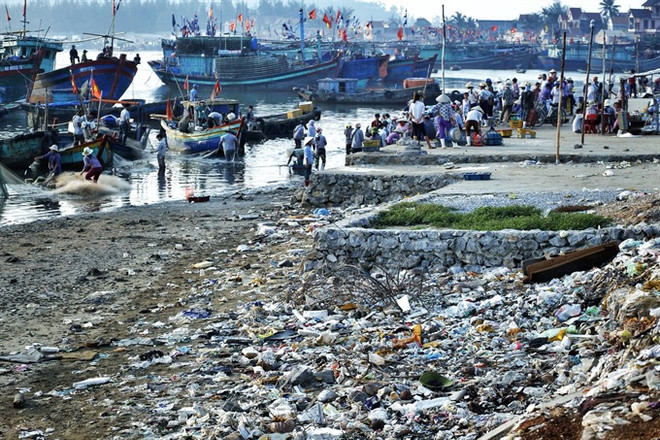 Plastic waste littered on the fishing port of Quynh Phuong in the central province of Nghe An (Photo: VNA)
Plastic waste littered on the fishing port of Quynh Phuong in the central province of Nghe An (Photo: VNA)Hanoi (VNS/VNA) - There are twokey components needed to rid the oceans of plastic, a senior professor haswarned.
Assoc. Prof. Nguyen Chu Hoi says the public need to cut down their usage andthe authorities need to look into the collections and treatment of plasticwaste in the sea.
Assoc. Prof. Hoi from the National University of Vietnam – Hanoi was speakingat the fourth edition of the international conference Ocean Dialogue, themedcombating plastic pollution, held on January 16 in Hanoi by the DiplomaticAcademy of Vietnam and the Australian Embassy.
The aim of the conference is to foster discussions and sharing of initiativesto manage plastic waste and boost regional cooperation.
“Cleaning up plastic debris in the sea is much more difficult compared to thaton land, it requires investment into technologies such as floaters withspecialised nets, which would be made easier with the collaboration betweencountries,” Hoi added.
Vietnam currently ranks 17th among the most heavily plastic-polluted countriesin the world, with half a million of tonnes of plastic waste ending up in theoceans.
The country is part of the Southeast Asian region, comprising mostly ofdeveloping countries where intensive use of plastic is disproportionate to theattention paid to the management of such waste, said Stacey Nation, politicalcounsellor of the Australian Embassy in Hanoi.
She stressed that no single country can unilaterally solve the problem withoutinternational cooperation.
Dr Nguyen Le Tuan, Director of the Sea and Island Research Institute under theMinistry of Environment and Natural Resources, said for Vietnam, plastic wasteis governed by the Law on Environment and the Law on Sea and Island NaturalResources and Environment.
There are also additional commitments to marine environment in the nationalstrategy for sustainable development of the maritime economy.
The country is working on the national action plan for the management of marineplastic waste, he said.
He said the Vietnamese economy needs to shift from the ‘linear economy’ to ‘circulareconomy’ where optimal production systems and designs allowing for maximisedrecycling rate to effectively eliminate waste and pollution, including plastic.
At the conference, Professor Carmen Ablan Lagman from the Biology Department ofthe Philippines’ De La Salle University, said as the sea in the region isplagued by microplastics, this could pose a devastating health hazard to ASEANcountries whose regional seafood consumption is three times higher than Westerncountries.
She urged countries in the region to have a more stringent approach tosingle-use plastics and require plastic producers to cooperate with theGovernments in handling the waste issue.
Considering marine plastic waste a global problem, Dr. Julyus Melvin Mobilikfrom Malaysia said in short term, alternatives for single-use plasticitems – like bags, cups and straws – are necessary, he advised, adding thatnations should devise suitable policies to encourage firms to developtechnologies that could shorten the lifespan of plastic waste.
Gilang Kembara from the Indonesia’s Centre for Strategic and InternationalStudies Jakarta (CSIS), talked about how the heavily visited island of Balihave banned single-use plastics.
Gilang added that in 2017, the Indonesian Government pledged up to 1 billion USDto reduce marine debris by 70 percent by 2025. However, the ambition plan toaddress the fact that Indonesia remains the second biggest marine plasticpolluter behind China has not been backed up by detailed policies.
According to an article released by the United Nations during its WorldEnvironment Day in 2019, humans each year discharge enough plastic into theoceans to circle the Earth four times over.
Scientists warned that without drastic remedy measures, the amount of marineplastic waste could even outstrip the weight of fish in the ocean by 2050.-VNS/VNA





























